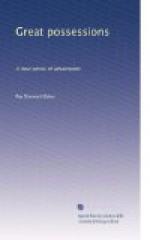A country life rather spoils one for the so-called luxuries. A farmer or gardener may indeed have a small cash income, but at least he eats at the first table. He may have the sweetest of the milk, there are thousands, perhaps millions, of men and women in America who have never in their lives tasted really sweet milk and the freshest of eggs, and the ripest of fruit. One does not know how good strawberries or raspberries are when picked before breakfast and eaten with the dew still on them. And while he must work and sweat for what he gets, he may have all these things in almost unmeasured abundance, and without a thought of what they cost. A man from the country is often made uncomfortable, upon visiting the city, to find two cans of sweet corn served for twenty or thirty cents, or a dish of raspberries at twenty-five or forty—and neither, even at their best, equal in quality to those he may have fresh from the garden every day. One need say this in no boastful spirit, but as a simple statement of the fact: for fruits sent to the city are nearly always picked before they are fully ripe—and lose that last perfection of flavour which the sun and the open air impart: and both fruits and vegetables, as well as milk and eggs, suffer more than most people think from handling and shipment. These things can be set down as one of the make-weights against the familiar presentation of the farmer’s life as a hard one.
One of the greatest curses of mill or factory work and with much city work of all kinds, is its interminable monotony: the same process repeated hour after hour and day after day. In the country there is indeed monotonous work but rarely monotony. No task continues very long: everything changes infinitely with the seasons. Processes are not repetitive but creative. Nature hates monotony, is ever changing and restless, brings up a storm to drive the haymakers from their hurried work in the fields, sends rain to stop the ploughing, or a frost to hurry the apple harvest. Everything is full of adventure and vicissitude! A man who has been a farmer for two hours at the mowing must suddenly turn blacksmith when his machine breaks down and tinker with wrench and hammer; and later in the day he becomes dairyman, farrier, harness-maker, merchant. No kind of wheat but is grist to his mill, no knowledge that he cannot use! And who is freer to be a citizen than he: freer to take his part in town meeting and serve his state in some one of the innumerable small offices which form the solid blocks of organization beneath our commonwealth.
I thought last fall that corn-husking came as near being monotonous work, as any I had ever done in the country. I presume in the great corn-fields of the West, where the husking goes on for weeks at a time, it probably does grow really monotonous. But I soon found that there was a curious counter-reward attending even a process as repetitive as this.
I remember one afternoon in particular. It was brisk and cool with ragged clouds like flung pennants in a poverty-stricken sky, and the hills were a hazy brown, rather sad to see, and in one of the apple trees at the edge of the meadow the crows were holding their mournful autumn parliament.




